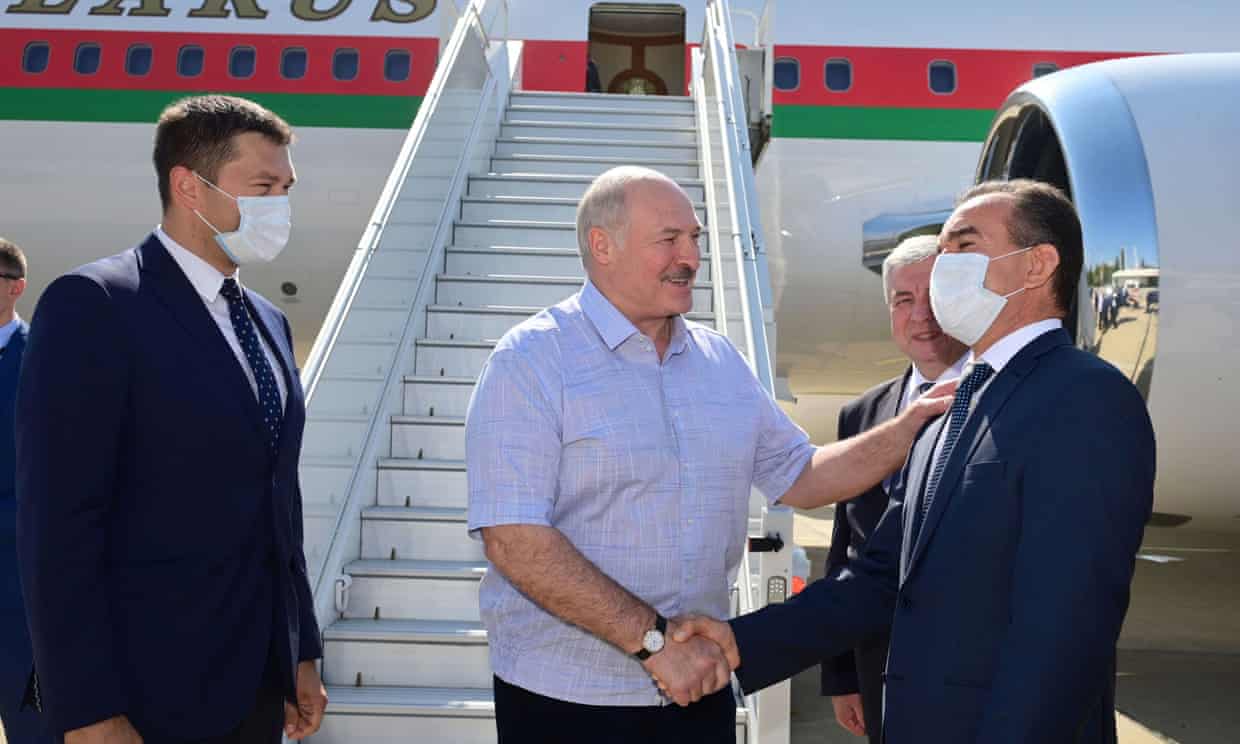Belarus
Russia to lend Belarus $1.5bn as Lukashenko tells Putin 'a friend is in trouble'
Belarusian president flies to Sochi for talks with Russian leader after month of protests
by Shaun WalkerThe embattled Belarusian president, Alexander Lukashenko, held lengthy talks with his Russian counterpart, Vladimir Putin, on Monday, in a meeting seen as crucial to determining whether or not Lukashenko can survive a protest movement against him.
The pair met at Putin’s residence in Sochi, the first foreign trip Lukashenko has made since protests began a month ago.
“A friend is in trouble, and I say that sincerely,” Lukashenko told Putin in televised remarks at the start of the meeting, thanking him for his support. Putin at times seemed visibly bored during the conversation, tapping his hands and feet as Lukashenko embarked on a long monologue. Putin said Russia would offer a loan of $1.5bn to Belarus, which could help Lukashenko avoid an economic crisis in the short term.
The pair later talked for four hours, said Putin’s spokesman Dmitry Peskov, characterising the conversation as “constructive, lengthy and substantive in content”.
He said Putin had backed Lukashenko’s idea of constitutional reform, something the opposition in the country have dismissed as window dressing without any real substance. Lukashenko has previously said he would rather die than relinquish power. Analysts say Putin does not particularly like or trust Lukashenko, but is loth to see power challenged by street protests in a country so close to Russia.
There were few further details of whether the pair made any agreements behind closed doors, or what Lukashenko promised in return for the financial aid. Some believe Putin’s game may be to force a weakened Lukashenko to accept further integration between the two countries, essentially resulting in a form of soft annexation.
Russia and Belarus nominally form a “union state” that is meant to involve close integration under a number of common institutions but in reality only exists on paper, partly because in the past Lukashenko has been reluctant to cede power.
The visit came a day after Lukashenko’s riot police struggled to deal with another huge rally in Minsk and other cities, in which water cannon were used against protesters. On Monday morning, the country’s interior ministry said 774 people had been detained on Sunday, including more than 500 in Minsk.
The slogan for the protest on Sunday, with Lukashenko’s meeting with Putin in mind, was was: “We won’t let him sell the country.” Although the protests have not been geopolitical, and many people in Belarus are pro-Russian, there is increasing disquiet at the Kremlin’s support for Lukashenko.
Svetlana Tikhanovskaya, who officially gained just 10% of the votes in last month’s presidential election but has declared herself “national leader” after she was forced into exile to neighbouring Lithuania, released a statement warning Putin that any agreements he made with Lukashenko would be deemed invalid. Tikhanovskaya has said she wants to preside over a transition period before new, free elections are held.
“I want to remind Vladimir Putin, whatever you agree on in Sochi will not have legal force,” Tikhanovskaya said on Monday. “Any agreements signed with the illegitimate Lukashenko will be revisited by the new government. Because the Belarusian people withdrew their trust and support for Lukashenko at the elections. I regret that you have decided on dialogue with a usurper, and not with the Belarusian people.”

Protests have been ongoing for more than a month, since Lukashenko declared victory in a presidential election on 9 August and then cracked down ruthlessly on protests in the aftermath.
In recent days, police have begun a renewed crackdown, and incidents caught on camera show that, for the first time, they have been willing to use violence against female protesters. Authorities have also targeted the leaders of the movement, particularly those involved in a coordination council set up to oversee a peaceful transition of power. Members have been arrested, threatened or deported.
Lukashenko has publicly asked Putin to intervene militarily in Belarus, painting the demonstrations as an arm of a Nato-led military assault on the country. Putin has declined to do so, but said he had prepared a contingent of law enforcement officers to send in if things got out of control. After the talks, Peskov said the two leaders had agreed this contingent would now be taken off high alert.
This week, Russia will send paratroopers to Belarus for 10 days of military exercises entitled “Slavic brotherhood”. Putin pointed out that there would be monthly military drills between Russian and Belarusian forces over the next year, but emphasised that the forces would not remain in Belarus after the drills.